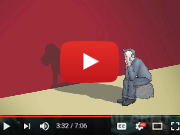|
Home
|
May 7, 2018
This week’s themeWords derived from animals This week’s words black dog gobemouche mooncalf pork barrel railbird 
I had a black dog, his name was depression (video, 4 min.)
A.Word.A.Day
with Anu GargEarthworms, dogs, monkeys, and humans. We are all cousins in the great journey of evolution. Chimps share 99% of our DNA. Our language shows our close relationship with our evolutionary mates, the non-human animals, in a vocabulary that’s filled with words derived from animals. Some of these words are obvious, others not. A constable is, literally speaking, a count of the stable. A canopy is a mosquito curtain (from Greek konops: mosquito) and a pavilion (from Latin papilion: butterfly) is a butterfly with his wings spread out. This week we’ll see five terms that have animals peeking from them. We’ll meet dog, fly, calf, pig, and bird. black dog
PRONUNCIATION:
MEANING:
noun: Depression.
ETYMOLOGY:
In the beginning, a black dog was a canine of dark complexion. Then it started
to be used metaphorically to refer to a counterfeit coin, perhaps because such
a coin was made of base metals (instead of silver or gold) that turn black
over time. Eventually, the term began to be applied to depression. The
lexicographer Samuel Johnson used the term in the 1780s for his own
depression: “When I rise my breakfast is solitary, the black dog waits to
share it, from breakfast to dinner he continues barking.” In modern times,
Winston Churchill popularized the term when he used it to describe his own
depression. Earliest documented use: 1665.
USAGE:
“Ed reacted without thinking. ‘I’m not that depressed,’ he said, and
regretted it. He wanted to talk about the damn black dog, didn’t he?” Bill Percy; Climbing the Coliseum; Xlibris; 2014. A THOUGHT FOR TODAY:
Convulsions in nature, disorders, prodigies, miracles, though the most
opposite to the plan of a wise superintendent, impress mankind with the
strongest sentiments of religion. -David Hume, philosopher, economist, and
historian (7 May 1711-1776)
|
|
Subscriber Services
Awards | Stats | Links | Privacy Policy
Contribute | Advertise
Awards | Stats | Links | Privacy Policy
Contribute | Advertise
© 1994-2026 Wordsmith